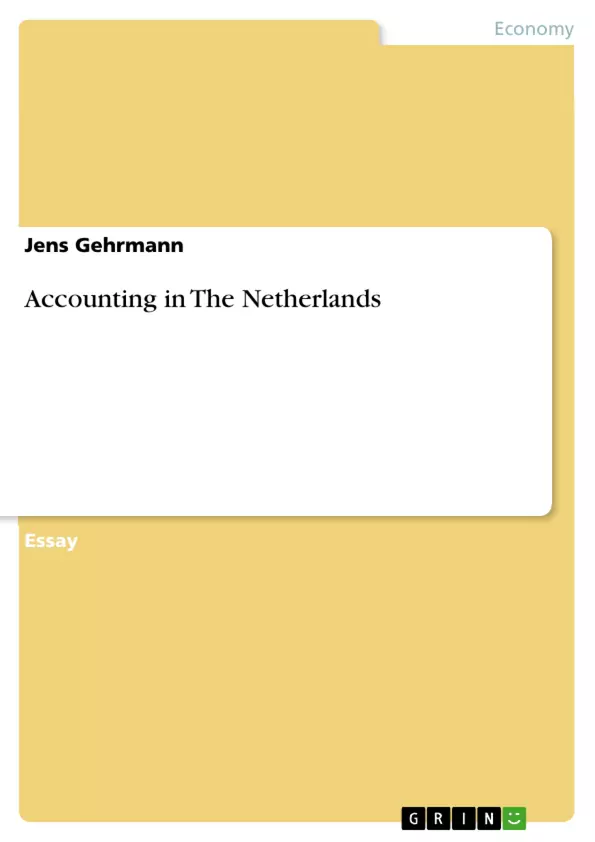This essay is meant to give a brief overview of accounting in The Netherlands. Accounting is examined under its background in the economy, politics, auditing, legal framework and institutions involved in accounting regulations. In times of globalisation and harmonisation accounting has to be taken in consideration as an important factor. The Netherlands as a founder of the IAS and the EU was always interested in moving towards harmonisation. The Netherlands accounting system, which is unique and difficult to classify, has a good reputation world-wide.
Inhaltsverzeichnis (Table of Contents)
- Introduction
- Economic backround
- Politics and institutions involved in setting accounting standards
- Historical issues of accounting in the 20th century.
- Legal Framework related to accounting
- Professionals and auditing
- Principles and practices including unique features...
- Replacement cost accounting and inflation accounting.
- Goodwill
- Research and development
- Stock and work in progress...
- Group accounting and consolidation......
Zielsetzung und Themenschwerpunkte (Objectives and Key Themes)
This essay aims to provide a concise overview of accounting practices in the Netherlands, examining the historical and contemporary landscape within the context of economic, political, and legal frameworks. It delves into the unique characteristics of the Dutch accounting system and its evolution, highlighting the role of institutions and professional bodies in shaping its development.
- Economic context and its impact on accounting practices in the Netherlands
- The role of politics and institutions in establishing and regulating accounting standards
- Historical evolution of accounting principles and practices in the 20th century
- Legal framework governing accounting in the Netherlands
- The role of professional bodies and auditing practices in the Dutch accounting landscape
Zusammenfassung der Kapitel (Chapter Summaries)
- Introduction: This chapter introduces the scope and purpose of the essay, emphasizing the importance of accounting in the era of globalization and harmonization. It also highlights the unique characteristics of the Dutch accounting system.
- Economic backround: This chapter examines the economic context of the Netherlands, outlining its highly industrialized nature, international orientation, and key industries. It also discusses the role of the banking sector and the stock exchange.
- Politics and institutions involved in setting accounting standards: This chapter explores the political structure of the Netherlands, highlighting the roles of various institutions in shaping accounting standards. It emphasizes the unique feature of employee representation in the Council for Annual Reporting.
- Historical issues of accounting in the 20th century: This chapter traces the historical development of accounting principles and practices in the Netherlands, outlining the influence of key figures like Professor Theodore Limperg and the impact of legislation.
- Legal Framework related to accounting: This chapter examines the legal framework governing accounting in the Netherlands, highlighting its codified system based on Roman law and the role of corporate law in regulating companies.
- Professionals and auditing: This chapter explores the role of professional bodies like the NIVRA and NOVAA in auditing and regulating accounting practices. It also discusses the qualifications and education requirements for chartered accountants in the Netherlands.
Schlüsselwörter (Keywords)
Key keywords and focus topics include: Dutch accounting, accounting standards, harmonization, globalization, economic context, political framework, legal framework, professional bodies, auditing, NIVRA, NOVAA, historical development, inflation accounting, replacement cost accounting, group accounting, consolidation.
Frequently Asked Questions
What makes the Dutch accounting system unique?
The Dutch system is unique due to its high industrialized nature, international orientation, and the specific role of institutions like the Council for Annual Reporting, which includes employee representation.
Which professional bodies regulate accounting in the Netherlands?
The primary professional bodies are NIVRA and NOVAA, which are responsible for auditing standards and the regulation of chartered accountants.
What is the legal basis for Dutch accounting?
It is based on a codified system derived from Roman law, with corporate law playing a significant role in regulating companies and their financial reporting.
Who was Professor Theodore Limperg?
He was a key historical figure in the 20th century who significantly influenced Dutch accounting principles, particularly in the areas of replacement cost accounting.
How does the Netherlands approach accounting harmonization?
As a founder of the IAS and the EU, the Netherlands has always been a strong proponent of moving towards international accounting harmonization and globalization.
Does Dutch accounting use replacement cost accounting?
Yes, the essay explores unique features of the Dutch system such as replacement cost accounting and inflation accounting.
- Quote paper
- Jens Gehrmann (Author), 2000, Accounting in The Netherlands, Munich, GRIN Verlag, https://www.grin.com/document/2660



